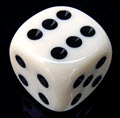how to find standard deviation of discrete random variable
Random Variables:
Mean, Variance and
Standard Deviation
A Random Variable is a set of possible values from a random experiment.
Example: Tossing a coin: we could get Heads or Tails.
Let's give them the values Heads=0 and Tails=1 and we have a Random Variable "X":

So:
- We have an experiment (like tossing a coin)
- We give values to each event
- The set of values is a Random Variable
Learn more at Random Variables.
Mean, Variance and Standard Deviation

Example: Tossing a single unfair die
For fun, imagine a weighted die (cheating!) so we have these probabilities:
| 1 | 2 | 3 | 4 | 5 | 6 |
| 0.1 | 0.1 | 0.1 | 0.1 | 0.1 | 0.5 |
Mean or Expected Value: μ
When we know the probability p of every value x we can calculate the Expected Value (Mean) of X:
μ = Σxp
Note: Σ is Sigma Notation, and means to sum up.
To calculate the Expected Value:
- multiply each value by its probability
- sum them up

Example continued:
| x | 1 | 2 | 3 | 4 | 5 | 6 |
| p | 0.1 | 0.1 | 0.1 | 0.1 | 0.1 | 0.5 |
| xp | 0.1 | 0.2 | 0.3 | 0.4 | 0.5 | 3 |
μ = Σxp = 0.1+0.2+0.3+0.4+0.5+3 = 4.5
The expected value is 4.5
Note: this is a weighted mean: values with higher probability have higher contribution to the mean.
Variance: Var(X)
The Variance is:
Var(X) = Σx2p − μ2
To calculate the Variance:
- square each value and multiply by its probability
- sum them up and we get Σx2p
- then subtract the square of the Expected Value μ2

Example continued:
| x | 1 | 2 | 3 | 4 | 5 | 6 |
| p | 0.1 | 0.1 | 0.1 | 0.1 | 0.1 | 0.5 |
| x2p | 0.1 | 0.4 | 0.9 | 1.6 | 2.5 | 18 |
Σx2p = 0.1+0.4+0.9+1.6+2.5+18 = 23.5
Var(X) = Σx2p − μ2 = 23.5 - 4.52 = 3.25
The variance is 3.25
Standard Deviation: σ
The Standard Deviation is the square root of the Variance:
σ = √Var(X)

Example continued:
| x | 1 | 2 | 3 | 4 | 5 | 6 |
| p | 0.1 | 0.1 | 0.1 | 0.1 | 0.1 | 0.5 |
| x2p | 0.1 | 0.4 | 0.9 | 1.6 | 2.5 | 18 |
σ = √Var(X) = √3.25 = 1.803...
The Standard Deviation is 1.803...
Let's have another example!
(Note that we run the table downwards instead of along this time.)

You plan to open a new McDougals Fried Chicken, and found these stats for similar restaurants:
| Percent | Year's Earnings |
|---|---|
| 20% | $50,000 Loss |
| 30% | $0 |
| 40% | $50,000 Profit |
| 10% | $150,000 Profit |
Using that as probabilities for your new restaurant's profit, what is the Expected Value and Standard Deviation?
The Random Variable is X = 'possible profit'.
Sum up xp and x2p:
| Probability p | Earnings ($'000s) x | xp | x2p |
|---|---|---|---|
| 0.2 | -50 | -10 | 500 |
| 0.3 | 0 | 0 | 0 |
| 0.4 | 50 | 20 | 1000 |
| 0.1 | 150 | 15 | 2250 |
| Σp = 1 | Σxp = 25 | Σx2p = 3750 |
μ = Σxp = 25
Var(X) = Σx2p − μ2
= 3750 − 252
= 3750 − 625
= 3125
σ = √3125 = 56 (to nearest whole number)
But remember these are in thousands of dollars, so:
- μ = $25,000
- σ = $56,000
So you might expect to make $25,000, but with a very wide deviation possible.
Let's try that again, but with a much higher probability for $50,000:
Example (continued):
Now with different probabilities (the $50,000 value has a high probability of 0.7 now):
| Probability p | Earnings ($'000s) x | xp | x2p |
|---|---|---|---|
| 0.1 | -50 | -5 | 250 |
| 0.1 | 0 | 0 | 0 |
| 0.7 | 50 | 35 | 1750 |
| 0.1 | 150 | 15 | 2250 |
| Σp = 1 | Sums: | Σxp = 45 | Σx2p = 4250 |
μ = Σxp = 45
Var(X) = Σx2p − μ2
= 4250 − 452
= 4250 − 2025
= 2225
σ = √2225 = 47 (to nearest whole number)
In thousands of dollars:
- μ = $45,000
- σ = $47,000
The mean is now much closer to the most probable value.
And the standard deviation is a little smaller (showing that the values are more central.)
Continuous
Random Variables can be either Discrete or Continuous :
- Discrete Data can only take certain values (such as 1,2,3,4,5)
- Continuous Data can take any value within a range (such as a person's height)
Here we looked only at discrete data, as finding the Mean, Variance and Standard Deviation of continuous data needs Integration .
Summary
- A Random Variable is a variable whose possible values are numerical outcomes of a random experiment.
- The Mean (Expected Value) is: μ = Σxp
- The Variance is: Var(X) = Σx2p − μ2
- The Standard Deviation is: σ = √Var(X)
how to find standard deviation of discrete random variable
Source: https://www.mathsisfun.com/data/random-variables-mean-variance.html
Posted by: rossantouch.blogspot.com

0 Response to "how to find standard deviation of discrete random variable"
Post a Comment